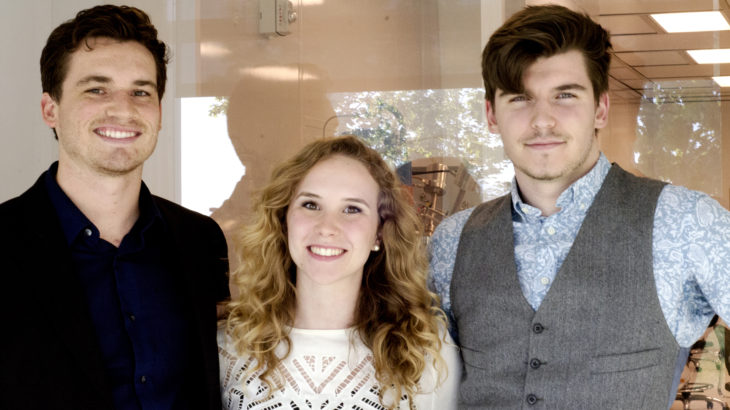University of Utah engineering students Brody King, Arielle Hassett and Jordan Davis are cofounders of XLynk, a medical startup company developing a spray-gel adhesion barrier to prevent adhesions forming after abdominal, gynecological or laparoscopic surgeries. The gel is sprayed into the body in a thin form, and as soon as it enters the body, it thickens to help prevent adhesions from forming.
“It’s cross-linking polymerizing,” King said. “There are two different components that when they spray together they cross-link, and then you have two thin-fluid components, and the fluid becomes a really thick gel.”
King developed the idea while shadowing an abdominal surgery at the University of Utah Hospital when he noticed the surgeon’s salinized adhesive gel “pooled at the bottom, so you could tell it wasn’t going to be effective,” King said. Adhesions develop frequently from abdominal and gynecological surgeries, so there is a high importance of having a successful barrier for prevention. It was at that point King and Davis decided to join forces to develop a better and more effective adhesive barrier, later bringing in Hassett.
King and Hassett are biomedical engineering majors and Davis is majoring in chemical engineering. Awarded by several donors at the Utah Entrepreneur Challenge, winning $9,500, XLynk was also helped by the Lassonde Entrepreneur Institute’s grant program called Get Seeded, winning $5,436. “It allowed us to get some chemicals and get some money to begin prototyping the hardware,” King said. “It’s nice to be using what our campus has to offer that I didn’t know about and didn’t utilize in the past,” Hassett added.
“Abdominal surgery is what we are targeting,” Hassett said, “and there is no barrier right now for the keyhole surgery.” There are two types of abdominal surgery, a laparotomy and laparoscopy, or “keyhole surgery.” The laparotomy surgery requires an adhesive barrier called Seprifilm, a paper-thin hydrogel sheet that will naturally dissolve in the body after seven days, “but it really is just not up to snuff,” Davis said. He explained, “40 percent of infertility can be attributed to adhesions, 40 percent of bowel obstructions and then 50 percent of chronic pain in general is caused by adhesions.” Unfortunately, there is no barrier for the laparoscopy, “and that is the market we really want to get into,” Hassett said.
XLynk is still working on the gel. “We are back to the drawing board on the chemistry,” Davis said. “The testing of the chemistry has to involve the delivery device because they are so tightly connected,” King added, “but right now we are doing it without the device to see if we can get the right mechanical properties of the gel.” As soon as they find the correct cross-link, they will be applying for FDA approval in order to begin testing to make sure the prevention barrier works.
Along with Lassonde Institute helping the startup company, XLynk has teamed up with Raminder Nirula, MD, the chief of acute care surgery at University of Utah; Shawn Owen, Ph.D., and professor of pharmaceutical chemistry at the University of Utah; as well as Don Treasure, JD and MBA, who is the director of corporate finance.



